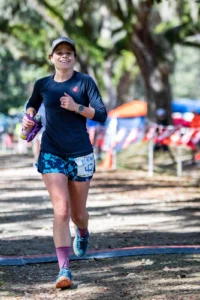The Cooper River Bridge Run brings tens of thousands of runners from all over the world to Charleston each year. Here, Charleston resident and Registered Dietician Kayla Fitzgerald shares her tips for fueling to “get over it” on race day.
Starting in Mount Pleasant and ending in historic downtown Charleston, the Cooper River Bridge Run is one of the most famous 10k running races in the United States. Each year, more than 30,000 runners toe the starting line and make their way through the streets of Mount Pleasant before running the roughly three-mile span of the iconic Ravenel Bridge.
While the course record for the Cooper River Bridge Run is an incredible 27:40, most runners will complete the course somewhere in the range of 45 minutes to about an hour and 15 minutes. Running for this amount of time requires proper fueling before—and perhaps during—the race. Here, Kayla Fitzgerald, owner of Endurance Nutrition in Charleston, shares her tips for making sure you are ready to perform your best on race day.
Q&A with Charleston, SC Registered Dietitian and Certified Intuitive Eating Counselor Kayla Fitzgerald

1. What is your background in nutrition?
I am a Registered Dietitian and Certified Intuitive Eating Counselor. After graduating from Kansas State University with a degree in Dietetics, I completed a yearlong Dietetic Internship at the Medical University of South Carolina, where I also worked as a clinical dietitian for a year. I then had an opportunity to take a job with a private practice in Charleston that allowed me to really start to figure out what area of nutrition I was most passionate about. After 4 years of working there, I figured it out and started my own business, Endurance Nutrition, which is also based in Charleston. I’ve been running for about eight years and have completed several ultras, which allows me to combine my love of nutrition and running!
2. What are some of the basics for maintaining a healthy diet while training for a race like the Bridge Run?
The biggest piece of advice I have is to eat enough! SO many active people view exercise as just a way to burn off calories or try to lose/maintain weight. The problem with this is that when you’re under-fueling, exercise doesn’t feel great, so you end up training for that big race and then you stop exercising. When you are fueling your body properly, exercise actually feels really good and you are able stay more consistent—which is much better for your health.
3. How important is customization when developing a nutrition plan or fueling for a race like the Cooper River Bridge Run?
It’s always really important. We have research that gives us basic guidelines to follow when it comes to fueling during a race, but there are wide ranges. For example, the minimum amount of sodium someone would want to consume per hour during a run is around 250mg. However, that number can climb as high as 1000mg+ for heavy and/or salty sweaters. Figuring out what works for you and practicing it well in advance of race day is key.
4. Some runners will be running their first 10k during the Bridge Run. How is fueling for a 10k different from fueling for a 5k?
It comes down to how long you think you’ll be out there and your own preference. For both distances, if you have fueled well beforehand, your body is likely able to complete that distance without any additional fuel. The big difference between 5k and 10k is that more people will want to hydrate for a 10k, whereas most people won’t hydrate during a 5k.
5. Some runners will be in their corral for an hour or more before the Bridge Run starts. Do you have any special tips for runners to stay fueled and hydrated during this time?
Yes! Bring fluids and some snacks with you. Keep your fluid intake to no more than eight ounces in that last hour before the race. Have a sports fuel product like a gel or chews; or, if you prefer “real food,” you could grab 1-2 applesauce pouches to total around 30 grams of carbs in that last 30 minutes before the race starts. Sports drinks are also a great option for runners with a sensitive stomach because they contain both carbs and fluid—just make sure you buy one with sugar in it and not one of the zero-sugar options.
6. How will runners’ fueling and hydration needs vary from the front of the pack to the back during the Bridge Run?
Great question. The longer you’re out there the more you’ll need to take in. When I create fueling plans for runners, they’re always based off of time and not distance. Those finishing the run in under 60 minutes would benefit from some hydration and electrolytes, whereas those finishing in over 60 minutes will want to incorporate some carbs as well since they’ll be out there longer.
7. What kind of meal do you recommend that runners eat the night before a 10k like the Bridge Run?
Keep it lower in fat and fiber to avoid any unwanted stomach issues the next day. Remember, you have about three miles on the bridge where there are no bathrooms! Some personal favorites are homemade pizza (skip the meat lovers), pasta with meat sauce and a small amount of veggies, stir fry that’s heavy on the rice and not a ton of veggies. Aim for about half of your plate to be low-fiber carbohydrates, about a quarter lean protein, and another quarter veggies.
8. What should runners do if they start to feel low on energy during the Bridge Run?
I always recommend carrying some type of fuel with you even if you don’t think you’ll need it. You never know what will happen, and you may be out there longer than anticipated. If you start to feel bad, get some carbs and fluids in as quickly as you can. It can be hard to bounce back once you start to feel bad, so having a plan and staying on top of it is your best bet.
9. Besides the Bridge Run, what are some of your favorite running races in the Charleston area?
I love to run all the trail runs with Eagle Endurance. Chad puts on some really fun races that range in distance from 5k the whole way up to 420 miles.

10. Where can Bridge Run participants learn more about preparing for the race and fueling on race day?
I share lots of tips on my Instagram @the.endurance.nutritionist, and through my business I work with runners via 1:1 coaching, small group coaching, online courses, and a membership option. When I started my business, it was really important for me to have ways that people can work with me at different price points so that as many people as possible can have access to what works best for them. I offer free 15- Minute Intro Calls where I can help you decide which option is the best fit for you, and my website is home to my blog as well as some free resources like a carb loading guide and a pre-run fueling guide.
*This is not personalized medical advice. You should always consult your healthcare provider before making any changes.
Planning Your Cooper River Bridge Run Weekend
This is all great advice, and we encourage anyone who has questions about fueling for the Cooper River Bridge Run—or about running nutrition and fueling in general—to visit Kayla’s website and schedule one of her free 15-Minute Intro Calls. If you’re in town and need to pick up any last-minute gels, chews, or other running supplies, you can visit Fleet Feet or the newly-opened REI in Mount Pleasant. For ideas on where to eat the night before the race—and what to do after the race, you can read our guide: Planning Your Cooper River Bridge Run Weekend.
Did you enjoy this article? Subscribe to get notified of new articles via email.
